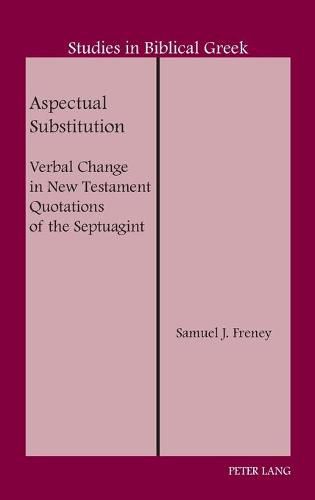Readings Newsletter
Become a Readings Member to make your shopping experience even easier.
Sign in or sign up for free!
You’re not far away from qualifying for FREE standard shipping within Australia
You’ve qualified for FREE standard shipping within Australia
The cart is loading…






This title is printed to order. This book may have been self-published. If so, we cannot guarantee the quality of the content. In the main most books will have gone through the editing process however some may not. We therefore suggest that you be aware of this before ordering this book. If in doubt check either the author or publisher’s details as we are unable to accept any returns unless they are faulty. Please contact us if you have any questions.
Aspectual Substitution: Verbal Change in New Testament Quotations of the Septuagint examines quotations where the New Testament author quotes the Septuagint but changes the tense-form of the verb, substituting one aspectual value for another, often in furtherance of a typological, prophetic, or theological connection. Taking into account various models of the verb in Koine Greek, including tenseless and aspect-prominent proposals, this study employs contrastive substitution to analyze the significance of aspectual substitution in quotations, concluding that the future tense-form encodes perfective aspect and is marked for future temporal reference.
$9.00 standard shipping within Australia
FREE standard shipping within Australia for orders over $100.00
Express & International shipping calculated at checkout
Stock availability can be subject to change without notice. We recommend calling the shop or contacting our online team to check availability of low stock items. Please see our Shopping Online page for more details.
This title is printed to order. This book may have been self-published. If so, we cannot guarantee the quality of the content. In the main most books will have gone through the editing process however some may not. We therefore suggest that you be aware of this before ordering this book. If in doubt check either the author or publisher’s details as we are unable to accept any returns unless they are faulty. Please contact us if you have any questions.
Aspectual Substitution: Verbal Change in New Testament Quotations of the Septuagint examines quotations where the New Testament author quotes the Septuagint but changes the tense-form of the verb, substituting one aspectual value for another, often in furtherance of a typological, prophetic, or theological connection. Taking into account various models of the verb in Koine Greek, including tenseless and aspect-prominent proposals, this study employs contrastive substitution to analyze the significance of aspectual substitution in quotations, concluding that the future tense-form encodes perfective aspect and is marked for future temporal reference.